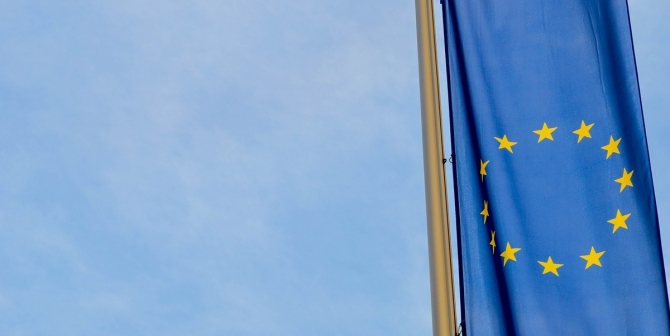 Sally Broughton Micova of the University of East Anglia explains the relevance of the new public consultations recently launched by the European Commission as part of its Digital Single Market initiative. For more information about upcoming consultations see here.
Sally Broughton Micova of the University of East Anglia explains the relevance of the new public consultations recently launched by the European Commission as part of its Digital Single Market initiative. For more information about upcoming consultations see here.
On Friday 25 September, the European Commission launched two consultations that really get to the heart of what was envisioned in its Digital Single Market Strategy (DSM). A consultation on geo-blocking asks for input from consumers and business about the challenges to buying and selling online within the EU, but does not deal directly with issues of copyright, although this is one of the reasons many online services are blocked in Europe. The other consultation, dealing with online services, however, directly deals with issues of authorship and liability, and introduces the concept of “collaborative economy”. Combined with the consultation on audiovisual media services (AVMS), which closes tomorrow, 30 September, and the satellite and cable (SatCab) consultation launched earlier this month, it seems there may be an opportunity for new thinking on the cross-border dissemination of content and copyright in Europe.
Platforms, Intermediaries and the Collaborative Economy
The consultation on the regulatory environment for platforms, online intermediaries, data and cloud computing, and the collaborative economy, aims to identify the characteristics of the range of new kinds of services that provide content online and find out what role(s) are they playing in the economy of the single market. In addition to raising concerns about consumer protection and the use of users’ data, the consultation opens up the question of the liability of online services for copyright. Currently there is an existing definition in the E-Commerce Directive of “internet intermediaries”, which are not liable for content as long as they are passive transmitters. However, this limited definition of one type of service hardly captures what is on the market today, including massive players such as Facebook and Google, as well as small blogs that allow readers to comment. The consultation seems to tackle this by distinguishing between platforms and intermediaries, and then seeks to further define different roles that intermediaries might play with varying degrees of liability for content.
The Commission wants to know if internet companies that distribute content rather than just act as hosts or conduits of data have been using the definition of intermediaries that frees them from liability as an excuse to refuse negotiating licencing agreements with the rights holders for digital content, and what is the impact if they have. Large corporate rights holders will no doubt submit vast figures representing their lost revenues, so it will be important for individual artists, filmmakers, producers, as well as the numerous professional and amateur creators of online content to respond to this consultation.
The platforms and intermediaries consultation closes with an interesting section about the “collaborative economy”, which it defines in terms of enabling people to exchange “assets, resources, time, skills, or capital, sometimes for a temporary period and without transferring ownership rights”. The examples provided in the consultation were obviously done with transport and accommodation services such as Uber and AirBnB in mind. Nevertheless, it would seem there is room here for input as to how collaborative economy approaches might also offer alternatives for remunerating creative work and funding content creation.
Audiovisual Media Services Directive
Before the arrival of multiple online services, content creation was largely funded by broadcasters, which are regulated by the Audiovisual Media Services Directive (AVMSD) that was last revised in 2007. One of the main issues at stake in the AVMS consultation currently underway is whether those services primarily funding the creation of content and rights holders in Europe are at a competitive disadvantage because of the current rules of the AVMSD that might leave out the plethora of online services providing content. The AVMSD currently covers only television broadcasts and on-demand services that can be classified as “TV-like”.
The term “TV-like” in the Directive is defined as services that compete for the same audience as live TV, and that are of a nature for which users would tend to expect a similar kind of regulation to that of television. Of course, the dynamics of the market in terms of what services compete with television has changed dramatically in the last 10 years. The AVMS consultation asks quite directly whether the AVMSD should be extended to providers of content that are not “TV-like,” or host user generated content (UGC). As I have argued in an earlier post on this consultation, before considering such extensions of scope, we need an understanding of public expectations regarding the responsibility various online services should have for content that the consultation related to online services launched on Friday seems aimed to uncover.
The SatCab Directive
The EU’s Satellite and Cable Directive is actually about copyright. Back in 1993 it was an attempt to tackle these then new content distribution systems, establishing a system for authors’ rights management for the cross-border re-transmission of content. In the EC’s consultation on copyright that ended in 2014, consumers complained strongly about not being able to access the same catalogues of TV shows and films from on-demand services such as Netflix or iPlayer across member states. While authors and producers pointed out that multi-national licenses were available, many broadcasters suggested extending the provisions of the SatCab Directive to cover new online services as a way to ease dealing with authors’ rights and to encourage cross-border access.
As with the AVMSD, the “country of origin” principle is fundamental to the SatCab Directive. This means it allows for the clearance of copyright in the country from which satellite directly broadcasts, and requires broadcasters to negotiate licensing with cable operators for the re-transmission of their broadcasts outside their country of origin. In the consultation on the SatCab Directive, which closes on 16 November, the Commission asks about whether this country of origin principle still holds up in the new environment, and whether the definition of re-transmission, as the simultaneous re-broadcasting of complete linear channels, needs to be changed to account for the new kinds of content providers, particularly on-demand services.
Redefining the playing field
According to Ofcom’s 2015 report, 78% of 16-25 year olds and 74% of 25-34 year olds in the UK use the internet for entertainment (see the report’s figure 45), not including social media such as Facebook and Twitter. The Commission is concerned about “ensuring a level playing field” among the various providers of content, particularly between the old media and the new forms on online content delivery entertaining the younger generations. It is asking people for their expectations of online services and whether extending the AVMS or SatCab Directives to online services is the way to go.
However, this redefinition of the “playing field” might offer new ways of defining authorship and of remunerating creative work. Many big media companies will argue, as they always have, that their investments in content depend on their ability protect copyright absolutely and to release content separately in different European markets. It is therefore important that individual citizens, authors and creators of content contribute to these three consultations their views on online services, copyright and cross-border dissemination of content.
This post gives the views of the author and does not represent the position of the LSE Media Policy Project blog, nor of the London School of Economics and Political Science.





